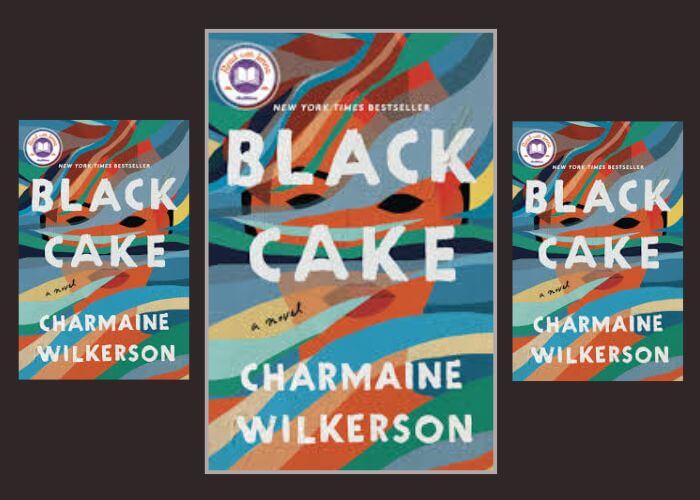Blog
Black Cake by Charmaine Wilkerson – Book Review

Introduction
Family recipes carry more than ingredients—they hold generations of love, tradition, and sometimes, carefully guarded secrets. In Charmaine Wilkerson’s debut novel, Black Cake, readers discover how a single traditional Caribbean black cake becomes the vessel for unveiling a family’s hidden history. Wilkerson is an American writer whose award-winning short fiction has graced various anthologies and magazines, and her transition to novel-length storytelling proves both ambitious and rewarding. This first novel weaves together themes of identity, inheritance, and the profound ways food, as it relates to memory, can shape relationships and history, creating a narrative that deserves to be meant to be savored.
Plot Summary (Spoiler-Free)
The story begins with Eleanor Bennett’s deathbed audio recording, where she leaves her estranged siblings, Byron and Benny, a puzzling inheritance: a traditional Caribbean black cake and instructions that will challenge everything the siblings thought they knew about their mother. Through this voice recording, Eleanor shares the story of her extraordinary past, revealing that their world was expanding beyond the simple narrative they had always believed.
Set across multiple timelines and locations—from Jamaica to Scotland to present-day California—the novel unfolds as Byron and Benny’s story of discovery. As they follow their mother’s final wishes, they uncover the mystery of a long-lost child and learn about Eleanor’s true identity as Covey, a young woman whose life was changed forever by the choices that forced her to abandon everything she knew. This inheritance of betrayals and secrets creates an extraordinary journey through the life of a family changed forever.
Themes and Literary Elements
Identity and Heritage
Wilkerson writes with a deep understanding of the Caribbean diaspora experience, exploring how cultural identity transcends geographical boundaries. The novel examines the complexity of racial and cultural identity, particularly for those who have lived in Jamaica but now find themselves navigating life in other countries. The traditional Caribbean black cake becomes a symbol of heritage that connects generations despite physical distance and emotional estrangement.
Family Bonds and Trauma
The relationship between mothers and children forms the emotional core of the narrative. Eleanor’s complicated past creates ripple effects that impact Byron and Benny in ways they’re only beginning to understand. The siblings, estranged for years, must confront not only their mother’s secrets but also their fractured relationship. Wilkerson’s debut explores how family expectations and hidden truths can create lasting trauma across generations.
Food as Cultural Memory
The black cake serves as more than just a dessert—it’s a recipe handed down for generations, carrying with it the weight of tradition and love. Wilkerson uses culinary heritage to explore how recipes become vessels for cultural memory, connecting past and present in ways that transcend spoken language.
Character Analysis
Eleanor/Covey emerges as a complex protagonist whose layered past reveals itself through short chapters that alternate between timelines. Her transformation from young Covey to Eleanor Bennett showcases Wilkerson’s skill in character development, creating a woman whose choices feel both devastating and understandable.
Byron and Benny represent different responses to family trauma and cultural identity. Their contrasting personalities and life paths create natural tension while allowing Wilkerson to explore various aspects of the immigrant experience and sibling dynamics.
The supporting cast of characters each plays crucial roles in revealing family history, from those who knew Covey in Jamaica to the people who helped shape Eleanor’s new life.
Writing Style and Structure
Wilkerson employs a dual timeline narrative that gradually reveals secrets through carefully paced revelations. Her background as a former journalist serves her well in crafting clear, engaging prose that moves seamlessly between past and present. The use of multiple perspectives allows readers to understand the full scope of the family’s story while maintaining suspense about key revelations.
Strengths
This novel, Black Cake, succeeds on multiple levels. Wilkerson’s authentic representation of Caribbean culture feels lived-in and genuine, avoiding stereotypes while celebrating the richness of the diaspora experience. The mystery structure keeps readers engaged, while the beautiful exploration of food and memory adds emotional depth to the narrative.
The book works particularly well as a great book club selection, offering rich material for discussion about family, identity, and the ways secrets shape our relationships. Reading this book feels like an extraordinary journey that rewards careful attention to the connections between past and present.
Areas for Improvement
While the book felt balanced overall, some readers might find that certain sections cover too many topics without fully exploring each theme. The multiple timelines, while generally effective, occasionally create pacing issues that might leave readers feeling more lost than ever as they navigate between different periods and locations.
The novel’s ambitious scope sometimes works against its emotional impact, as Wilkerson attempts to address numerous complex themes within a single narrative structure.
Cultural and Social Context
Black Cake by Charmaine Wilkerson arrives at a time when readers are increasingly seeking diverse voices and authentic cultural representation. The novel contributes meaningfully to the growing body of literature exploring Caribbean identity and the immigrant experience. Wilkerson’s work stands alongside other contemporary authors who are expanding the literary landscape with stories that reflect the complexity of modern cultural identity.
Target Audience and Comparisons
This book will particularly appeal to readers who enjoyed works by authors like Elizabeth Acevedo, Naomi Jackson, or Nicole Dennis-Benn. Those intrigued by these narrators who blend cultural specificity with universal themes of family and belonging will find much to appreciate. The novel works exceptionally well for book club discussions, offering multiple entry points for conversation about heritage, family dynamics, and the immigrant experience.
The anthology quality of Wilkerson’s short stories translates well to the novel format, creating a work that rewards both casual readers and those seeking deeper literary engagement.
Final Verdict
Rating: 4/5 Stars
Black Cake represents a strong debut that establishes Charmaine Wilkerson as a voice worth following. While not without minor structural issues, the novel succeeds in creating an emotionally resonant story that honors both Caribbean heritage and the universal experience of family secrets. The success of black cake as both symbol and narrative device demonstrates Wilkerson’s skill in weaving together personal and cultural history.
Conclusion
Wilkerson’s debut makes a meaningful contribution to contemporary literature by centering Caribbean voices and experiences while exploring universal themes of family, identity, and belonging. Her background in short fiction serves her well in crafting a novel that balances multiple storylines and time periods with skill and sensitivity.
For readers seeking stories that honor cultural heritage while exploring the complexities of modern family life, Black Cake offers a rich, rewarding experience. Charmaine Wilkerson has established herself as an important new voice in literary fiction, and readers will likely eagerly anticipate her future work.
Whether you’re drawn to stories of family mystery, cultural exploration, or simply beautiful writing about food and memory, this novel deserves a place on your reading list. Find the book at your local bookstore or online retailer, and prepare for a story that will linger in your memory long after the final page.
